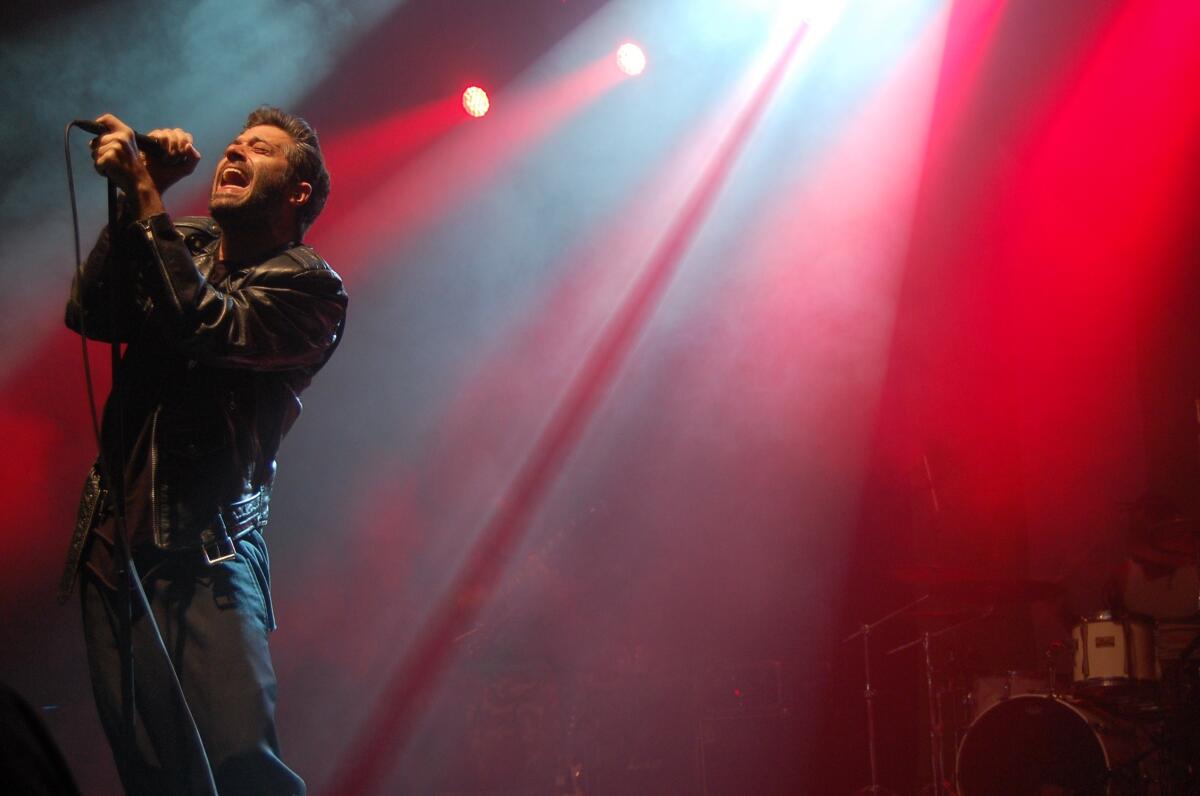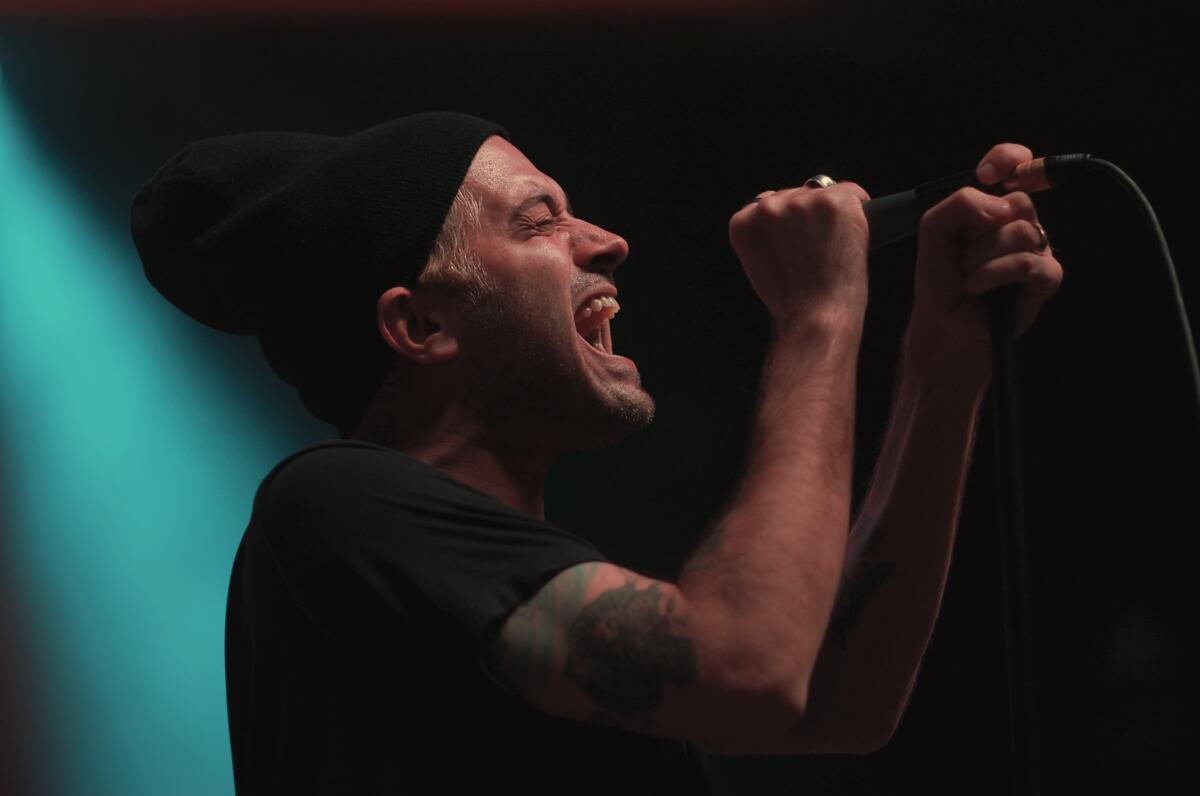After 30 years, post-hardcore band Glassjaw is still not down for the count

- Share via
Glassjaw vocalist Daryl Palumbo still has a hard time using the word “legacy” to describe his band’s contribution to the post-hardcore scene.
“There’s so much pomposity in saying ‘legacy’ when I already have a hard enough time accepting any sort of compliments or hearing that my band did anything significant,” he said.
”I get that we all have a legacy — like if you’re a criminal who dies in prison, that’s your legacy — but I never drank the Kool-Aid.”
And yet, 30 years after forming the band as teenagers in Long Island, N.Y., in 1993, Palumbo and co-founding guitarist Justin Beck continue to see their impact play out in packed mosh pits across the world whenever they decide to return to the stage.
This week, Glassjaw returns to a sold-out crowd at the Echoplex on Dec. 21 (with an additional show the night before at the Observatory in Santa Ana) to kick off a short tour celebrating its three-decade milestone.
The band’s first two full-length releases — 2000’s “Everything You Ever Wanted to Know About Silence” and 2002’s “Worship and Tribute” — shaped the early 2000s New York post-hardcore scene alongside bands like Quicksand and Thursday.
Palumbo’s emotionally raw yet skillful vocals, combined with Beck’s unconventional rhythms and guitar licks, created a heavy and visceral sound that added musical exploration and lyrical allegories to the rage and vitriol of hard rock.
While others stuck with power chords, simple rhymes and standard time signatures, Glassjaw has always been more of an art project for the duo rather than a commercial success.
“Glassjaw was just a very young, pretty suburban version of a lot of [New York hardcore bands], but it’s an honor whenever anyone tells us they’re a fan,” Palumbo says. “I love music, and I’m a fan of everything from rap to metal, and I love the changes that I’ve heard in hardcore. I don’t keep up as much on modern bands as I should,” Palumbo says, though he said he’s proud to see bands like Turnstile that continue to push eclectic, hardcore-infused jams.
“They’re very much considered hardcore, and they play to thousands of people at giant festivals without sacrificing any of their integrity,” Palumbo said. “That didn’t exist when we were young, so it’s an honor that I could not possibly put into words to even be told that Glassjaw left a tiny dent on the face of this big ‘alternative’ universe we live in.”

With the resurgence of hardcore and post-hardcore reaching a bigger (and younger) audience than ever before, members of Gen Z and beyond are discovering the genres’ influential bands and elevating them to new heights. For Glassjaw, which hasn’t been a full-time focus for any of its members since 2003, it means an expanding fan base even when Beck and Palumbo’s attention is elsewhere.
But it also means there are more distractions for Glassjaw to contend with than ever before. Beck spends his days running his band merchandise giant MerchDirect as it approaches its 25th year (and also looking at new business ventures), while Palumbo left New York for Florida and continues to work as an artist. He relaunched his poppier project, Head Automatica, earlier this year.
Although Glassjaw’s 30th anniversary tour is only five dates across three cities, that scarcity is also some of the appeal for the band’s fervent following. Despite their lasting impact (they spent much of 2022 on a sold-out tour celebrating the 20th anniversaries of their first two albums), Palumbo and Beck haven’t tarnished their legacy by watering down their discography with halfhearted cash grabs or inflated releases.
Since reaching the MTV2 audience in the early 2000s, Glassjaw has released only a trio of EPs (one of which is an iTunes-exclusive trio of B-sides from “Worship and Tribute”) and 2017’s “Material Control.”
Even without frequent new releases, Palumbo and Beck have always been insistent that Glassjaw isn’t going away. Since their brief hiatus for Palumbo to help manage his Crohn’s disease and focus on Head Automatica’s 2004 debut, “Decadence,” the two collaborators have performed at least a few shows (often one-off festivals) every nonpandemic year. Even their rotating cast of a rhythm section has stabilized a bit in recent years, with Chad Hasty not only performing with Glassjaw since 2015 but also sitting behind the kit for the Head Automatica reunion tour.
While it may seem to those on the outside like the future of Glassjaw is always in flux, Palumbo and Beck have been creatively “married” for long enough that it seems like only one of their deaths would prevent the band from hitting the stage once in a while.
“For Justin and I to have been as close as we are since we were literally children, it’s pretty crazy to see the things that we’ve done together,” Palumbo says. “We’re just a couple of dudes from New York who never took any of this too seriously. Glassjaw has existed for us way longer than it hasn’t, and it’s been 30 years of inside jokes and expecting things to all go wrong. I could be eating dinner with my family, but if you tell me I have to jump in and play a Glassjaw show, I could do it.”
Despite more than 20 years and a lot of emotions passing since the duo wrote the vast majority of Glassjaw’s live show catalog, some things haven’t changed. Beck is still the sensible businessman of the group, Palumbo is still the electrifying wild card, and both still carry the signature New York pessimism, sense of humor and passion that rings true regardless of generation.
“I still like the venom and passion that was in a lot of the old songs, but there is a level of disrespect and lack of couth that sometimes I don’t dig,” Palumbo says. “We don’t play certain songs live, because I don’t really need to be as venomous as I used to be. These days, I know how to harness my inner voice and use it as a tool. I can play with that anger and that venom without being fully led by my emotions. But Glassjaw will always remain ugly and edgy and irreverent. It’s heavy music. There’s never anything happy.”
More to Read
The biggest entertainment stories
Get our big stories about Hollywood, film, television, music, arts, culture and more right in your inbox as soon as they publish.
You may occasionally receive promotional content from the Los Angeles Times.









